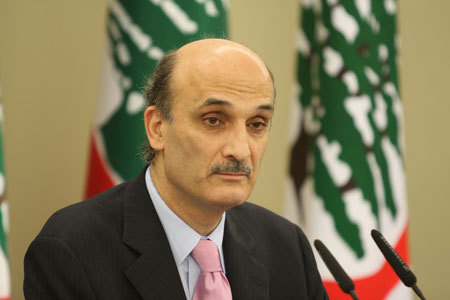
"My brothers in Lebanon, Syria, Palestine, Iraq, Egypt and throughout the region, do not be afraid ... immerse yourselves in the suffering of the peoples of the region, always be leaders of the liberation movements and progress," said Geagea, who has traditionally been a critic of Damascus.
He said the region's minority Christians had become "sandbags defending brutal and backward regimes."
Earlier this month, during his first visit to France, the head of Lebanon's Maronite Christians Patriarch Beshara Butros Rai urged that Syrian President Bashar al-Assad -- once the arch-enemy of Lebanon's Maronites -- be given a chance to implement reforms, saying the "poor man cannot work miracles."
Many of Syria's minority Christians, which include Maronites, are concerned that Islamic extremists could rise to power should the Syrian regime collapse.
Rai had echoed that fear, voicing concern of a takeover by the radical Muslim Brotherhood, a movement the Syrian authorities have blacklisted for decades.
Christians must not remain "spectators before the Arab spring ... for us this is a matter of life or death," Geagea shot back.
Lebanon's Maronite Christians, once united against Syria's 30-year sway over Lebanon, are now divided over the anti-regime uprising in Syria. The United Nations says more than 2,700 people have been killed in the Syrian regime's crackdown on protests that began in mid-March.
Maronites allied with Shiite militant group Hezbollah, which is supported by Syria and Iran, are backing Assad and accusing radical Sunnis of stirring the unrest.
Other Lebanese Christians, allied with pro-Western former premier Saad Hariri, have voiced support for the anti-Assad protests.
Christian minorities in Syria, comprising 4.1 percent of the population, live in harmony with the Alawite minority in power, while the vast majority of the 18 million Syrians are Sunnis.
----------------------------------------------------------------------------------
He said the region's minority Christians had become "sandbags defending brutal and backward regimes."
Earlier this month, during his first visit to France, the head of Lebanon's Maronite Christians Patriarch Beshara Butros Rai urged that Syrian President Bashar al-Assad -- once the arch-enemy of Lebanon's Maronites -- be given a chance to implement reforms, saying the "poor man cannot work miracles."
Many of Syria's minority Christians, which include Maronites, are concerned that Islamic extremists could rise to power should the Syrian regime collapse.
Rai had echoed that fear, voicing concern of a takeover by the radical Muslim Brotherhood, a movement the Syrian authorities have blacklisted for decades.
Christians must not remain "spectators before the Arab spring ... for us this is a matter of life or death," Geagea shot back.
Lebanon's Maronite Christians, once united against Syria's 30-year sway over Lebanon, are now divided over the anti-regime uprising in Syria. The United Nations says more than 2,700 people have been killed in the Syrian regime's crackdown on protests that began in mid-March.
Maronites allied with Shiite militant group Hezbollah, which is supported by Syria and Iran, are backing Assad and accusing radical Sunnis of stirring the unrest.
Other Lebanese Christians, allied with pro-Western former premier Saad Hariri, have voiced support for the anti-Assad protests.
Christian minorities in Syria, comprising 4.1 percent of the population, live in harmony with the Alawite minority in power, while the vast majority of the 18 million Syrians are Sunnis.
----------------------------------------------------------------------------------









 Home
Home Politics
Politics









